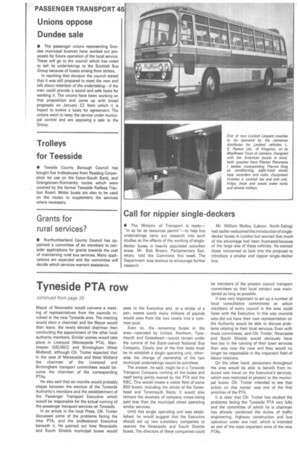Tyneside PTA row
Page 47

If you've noticed an error in this article please click here to report it so we can fix it.
continued from page 35 Mayor of Newcastle would convene a meeting of representatives from the councils involved in the new Tyneside area. The meeting would elect a chairman and the Mayor would then leave, the newly elected chairman then conducting the appointment of the other local authority members. Similar scenes would take place in Liverpool (Merseyside PTA), Manchester ISELNEC) and Birmingham (West Midland), although ClIr. Trotter expected that in the case of Merseyside and West Midland the chairmen of the Liverpool and Birmingham transport committees would become the chairmen of the corresponding PTAs.
He also said that six months would probably elapse between the election of the Tyneside Authority's members and the establishment of the Passenger Transport Executive which would be responsible for the actual running of the passenger transport services on Tyneside.
In an article in the local Press, Cllr. Trotter discussed some of the problems facing the new PTA, and the professional Executive beneath it. He pointed out how Newcastle and South Shields municipal buses would pass to the Executive and, at a stroke of a pen, assets worth many millions of pounds would pass from the two towns into a common pool.
Even so, the remaining buses in the area—operated by United, Northern, Tynemouth and Gateshead—would remain under the control of the State-owned National Bus Company. Clearly one of the first tasks must be to establish a single operating unit, otherwise the change of ownership of the two municipal undertakings would be pointless.
The answer, he said, might lie in a Tyneside Transport Company running all the buses and itself being jointly owned by the PTA and the NBC. This would Create a viable fleet of some 850 buses, including the whole of the Gateshead and Tynemouth fleets. It would also remove the anomaly of company crews being paid less than the municipal crews operating similar services.
Until this single operating unit was established, he would suggest that the Executive should set up two subsidiary companies to operate the Newcastle and South Shields buses. The directors of these companies could be members of the present council transport committees so that local contact was maintained as long as possible.
It was very important to set up a number of local consultative committees on which members of every council in the area could liaise with the Executive. In this way councils who did not have their own representation on the Authority would be able to discuss problems relating to their local services. Even with these committees, said ClIr. Trotter, Newcastle and South Shields would obviously have less say in the running of their town services than was now the case and they would no longer be responsible in the important field of labour relations.
On the other hand, pensioners throughout the area would be able to benefit from reduced rate travel on the Executive's services, which was restricted at present to the municipal buses. Clir. Trotter intended to see that action on this matter was one of the first priorities of the PTA.
It is clear that Cllr. Trotter has studied the problems facing the Tyneside PTA very fully and the committee of which he is chairman has already combined the duties of traffic engineering, highway construction and bus operation under one roof, which is intended as one of the most important aims of the new PTAs.












































































































































































